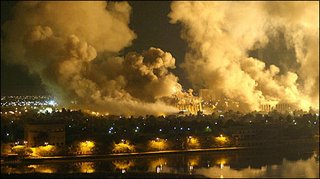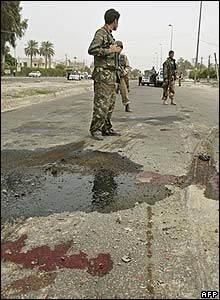"Mission Accomplished"

It's been three years now since we invaded Iraq based on a slew of lies and doctored intelligence. I still remember vividly that day in March of 2003. I was on vacation in Florida and ended up spending most of my time there glued to the TV, watching CNN and other news networks for updates on the US invasion. The sinking feeling in the pit of my stomach as the TV covered the fireworks of the "shock and awe" campaign hasn't subsided, but it's been joined over the past three years by burning frustration and shame. My government is responsible for the atrocities in Iraq, and therefore I am responsible too.
 The end is nowhere in sight and the country of Iraq is slipping further and further into oblivion with each passing day of the US occupation. Conservative estimates on the casualties suffered by US forces and the Iraqi people are given below. When are we as Americans going to stand up and demand that our government end this disastrous endeavor? When will the cost, both human and financial, finally be too much?
The end is nowhere in sight and the country of Iraq is slipping further and further into oblivion with each passing day of the US occupation. Conservative estimates on the casualties suffered by US forces and the Iraqi people are given below. When are we as Americans going to stand up and demand that our government end this disastrous endeavor? When will the cost, both human and financial, finally be too much?Here are some of the things that appeared in the press today, noting another anniversary of this tragic chapter in US history.
From the AP:
Beginning the fourth year of an unpopular war, President Bush defended his Iraq record on Monday against skeptical questioning. He said he could "understand people being disheartened" but appealed to Americans to look beyond the bloodshed and see signs of progress.Hmm. It's a tricky thing, progress...
From the New York Times:
"It is unfortunate that we are in civil war," said Mr. [Ayad] Allawi, who served as prime minister after the American invasion and now leads a 25-seat secular alliance of representatives in Iraq's 275-seat National Assembly. "We are losing each day, as an average, 50 to 60 people through the country, if not more."And from the NYT Editorial Page on Sunday:
"If this is not civil war," he said, "then God knows what civil war is."
...Mr. Allawi's assessment was contradicted by Gen. George W. Casey Jr., the senior American commander in Iraq, who said on the CNN program "Late Edition" on Sunday that "We're a long way from civil war."
The war has taken more than 2,300 American lives, and those of 33,000 to 37,000 Iraqis, according to the estimates of the Iraq Body Count Project, an independent group that monitors the news media.
Three years ago, the United States invaded Iraq. We can all run the story through our minds: Shock and Awe, Coalition of the Willing, Mission Accomplished, looting, "Stuff happens," no W.M.D., suicide bombers, purple fingers, blasted shrine.From The Independent/UK, this article entitled " Iraq Occupation: Three Years On and Still They're Lying to Us":
Many who supported the invasion have taken this anniversary to argue that it all would have been worthwhile if things had been run better. They argue that if the coalition forces had been large enough to actually secure the country, to keep insurgents from raiding Saddam Hussein's ammunition depots, to give the people a sense of safety, the country might well be on the road to a hopeful future.
We doubt it. The last three years have shown how little our national leaders understood Iraq, and have reminded us how badly attempts at liberation from the outside have gone in the past. Given where we are now, the question of whether a botched invasion created a lost opportunity might be moot, except for one thing. The man who did the botching, Donald Rumsfeld, is still the secretary of defense.
Mr Bush faces a difficult balancing act between downplaying difficulties in Iraq and raising expectations of a pullout of American forces. In his weekly radio address yesterday he urged Americans to resist the temptation to retreat from Iraq. Despite "horrific" images, he said, progress was being made on the political and military fronts.From AlterNet:
"These past three years have tested our resolve. We've seen hard days and setbacks," Mr Bush said. But his administration was "fixing what has not worked". With the President reduced to appealing to Iraqi leaders to achieve a consensus, however, the limits on his ability to influence events were clear.
At the end of last year, Iraqis had 11 percent less electricity and 36 percent less potable water than before the 2003 invasion. The number of Iraqis with sewer access has fallen by 90 percent, and oil output is down by more than 20 percent. A poll in mid-2004 found that seven out of 10 Iraqis see the United States as "occupiers," not "liberators." A more recent survey (PDF) showed that almost half of all Iraqis support armed attacks on U.S. troops. And this weekend, former Iraqi interim Prime Minister Iyad Allawi told the BBC that Iraq was smack in the middle of a civil war.From The Guardian:
That is the essential truth of what we have wrought in Iraq.
That's the reality 35 months after the president stood before a banner reading "Mission Accomplished" and thanked "all of the citizens of Iraq who welcomed our troops and joined in the liberation of their own country."
For three long and disastrous years, the administration has continued to put that sunny spin on the havoc it has wrought. As long as that obstinate state of denial persists, we have little reason to hope for anything better before we face the war's fourth anniversary.
The US commander in Iraq, General George Casey, said that the troop withdrawals he had forecast for this spring or summer might have to wait until the end of the year or even 2007. And Paul Eaton, a former American army general in charge of training Iraqi forces until 2004, marked the anniversary with a furious attack on Mr Rumsfeld, saying he was "not competent to lead our armed forces".From the BBC:
Since the invasion of Iraq three years ago, the US military has lost more than 2,300 troops in combat, roadside explosions, insurgent attacks and friendly fire. But that figure is dwarfed by estimates for the number of Iraqis killed, which range from a conservative 30,000 to a more speculative 100,000. As many as 50 people are killed every day. Britain has lost 103 soldiers in Iraq, while other nations together have lost 94 troops. But the cost of war has not just been measured in human terms. There is the financial cost. The US is still spending $6bn (£3.5bn) a month in Iraq, primarily on the 130,000 troops it still maintains in the country.
The third anniversary of the US-led invasion of Iraq earns scornful press comment across the Middle East, with many papers angry at what they see as the gap between President Bush's rhetoric and the Iraqi reality.More from the BBC:
There is outrage at the conditions on the ground, with one paper asking "is the daily discovery of bodies the freedom President Bush says Iraqis are living in?"
There is also widespread disbelief at President Bush's continued assertion that the ousting of Saddam Hussein has made the world a safer place.
Coalition officials assured us that the elections in January and December last year would result in a down-turn in the number of killings and bombings. They were wrong, too. Today the situation in Iraq is worse than at any time since the fall of Saddam.
 It's hard to maintain a sense of optimism in the face of this distaster, but I like the sentiment of this piece published on Common Dreams today. It gives a constructive focus to the outrage that many of us feel.
It's hard to maintain a sense of optimism in the face of this distaster, but I like the sentiment of this piece published on Common Dreams today. It gives a constructive focus to the outrage that many of us feel.Almost 40 years ago Martin Luther King talked about what he called "the madness of militarism." And it's with us, here and now; it's with us in the United States every time a child is malnourished, every time people need medical care and don't get it and suffer and sometimes lose their lives, while the military budgets of this country -- over half a trillion dollars a year -- are spent not on defense but on military expenditures, which dwarf anything that could be accurately described as defense. The madness of militarism that Dr. King talked about is expressed every day by the likes of Senator Feinstein, who demands "competence" in war and says that it must be done right.Here are some resources for folks that want to help take action:
We need a peace effort, not a war effort, from the United States. Instead of doing a better job of killing, there's a movement around this country to compel what is said to be our own government to do a much much much better job of sustaining life -- instead of taking it.
The problem isn't that this war may not be winnable. The problem is the war was and is and always will be wrong, and must be stopped.
At every demonstration for peace and social justice, why are we here? Because those are values we want to live for.
And why are we here on this earth? Why are any of us here? Not an easy question to answer. But activism is a way of insisting that we're not here to be part of war machinery. We're not here to be part of the killing, we're not here to aid and abet or enable those like George W. Bush who lead the charge to slaughter in the name of freedom to serve profit. We're here with a very different mission.
Bring Them Home Now
Military Families Speak Out
United For Peace And Justice
Amnesty International
True Majority Action
Move On


0 Comments:
Post a Comment
<< Home